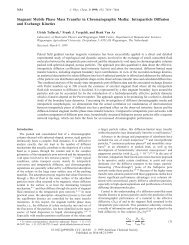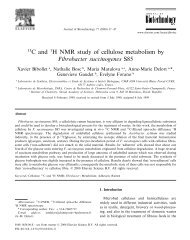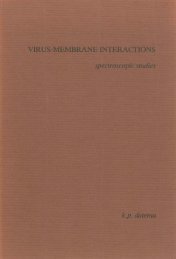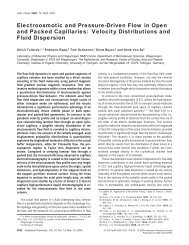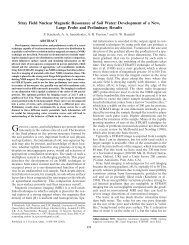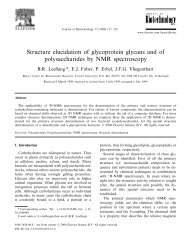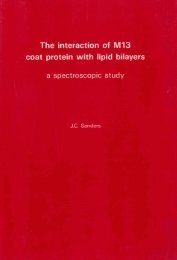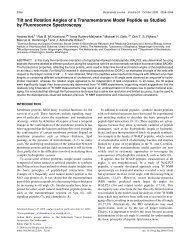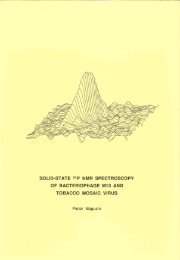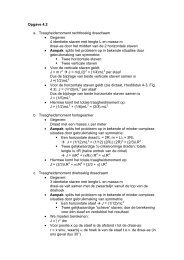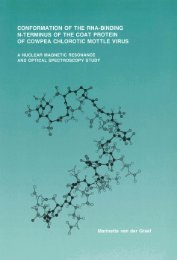Biophysical studies of membrane proteins/peptides. Interaction with ...
Biophysical studies of membrane proteins/peptides. Interaction with ...
Biophysical studies of membrane proteins/peptides. Interaction with ...
You also want an ePaper? Increase the reach of your titles
YUMPU automatically turns print PDFs into web optimized ePapers that Google loves.
the tilt angle, and maintain a larger section <strong>of</strong> the hydrophobic domain inside the bilayer<br />
(Figure I.16). When the bilayer thickness is larger than the protein hydrophobic domain,<br />
the TM protein might find that compensation by change <strong>of</strong> tilt angle is not possible or it<br />
is insufficient, and the only route available to decrease exposure <strong>of</strong> hydrophobic<br />
aminoacid side-chains is aggregation. Recently, mcp was shown to change its tilt angle<br />
when incorporated in bilayers <strong>with</strong> different hydrophobic thickness (Koehorst et al.,<br />
2004).<br />
Results obtained for fluorescence self-quenching <strong>of</strong> BODIPY labelled mcp<br />
incorporated in binary lipid mixtures composed by lipids <strong>with</strong> different acyl-chain<br />
lengths are dramatically different from the results obtained <strong>with</strong> pure lipids. The<br />
apparent diffusion coefficients retrieved from the analysis <strong>of</strong> this data are clearly not<br />
justified on the basis <strong>of</strong> normal diffusion <strong>of</strong> monomeric species (as it was for mcp in<br />
DOPC), or on the basis <strong>of</strong> protein oligomerization/aggregation (as it as for mcp in<br />
DMoPC and in DEuPC). In this case, only segregation <strong>of</strong> mcp into domains enriched in<br />
the hydrophobically matching lipid can provide rationalization <strong>of</strong> the data. This<br />
hypothesis is confirmed by FRET <strong>studies</strong> that are also consistent <strong>with</strong> mcp segregation<br />
in the presence <strong>of</strong> binary mixtures <strong>of</strong> lipids <strong>with</strong> different acyl-chains. Importantly, the<br />
lipid components used in the binary mixtures are not dramatically different, the only<br />
difference being the presence <strong>of</strong> 4 additional carbons in the acyl-chain <strong>of</strong> one <strong>of</strong> the<br />
lipids. This difference is not expected to result in large scale phase separation <strong>of</strong> the<br />
lipid components such as it was detected in the FRET <strong>studies</strong> (domain size larger than<br />
or comparable to the Förster radius <strong>of</strong> AEDANS-BODIPY, 48.8 Å). In this way,<br />
formation <strong>of</strong> large domains enriched in the hydrophobically matching lipid must be a<br />
consequence <strong>of</strong> incorporation <strong>of</strong> mcp. Nevertheless, experiments making use <strong>of</strong> the<br />
properties <strong>of</strong> 1,6-diphenylhexatriene, indicate that even in the absence <strong>of</strong> protein, short<br />
scale clustering <strong>of</strong> the lipids in the binary mixtures is expected to occur.<br />
The same type <strong>of</strong> segregation <strong>of</strong> mcp was not detected when the acyl-chains’ lengths<br />
<strong>of</strong> the lipid components in the binary mixtures were identical and the only difference<br />
resides in the headgroups, confirming the crucial relevance <strong>of</strong> hydrophobic matching for<br />
protein organization.<br />
Concerning the quantification <strong>of</strong> the lipid selectivity <strong>of</strong> mcp, FRET proved to be a<br />
valuable tool, and an important alternative to ESR in these type <strong>of</strong> <strong>studies</strong>. FRET was<br />
able to detect lipid enrichment around monomeric mcp in a binary lipid mixture, while<br />
ESR was unable to resolve this problem (Sanders et al., 1992). Relative association<br />
182



